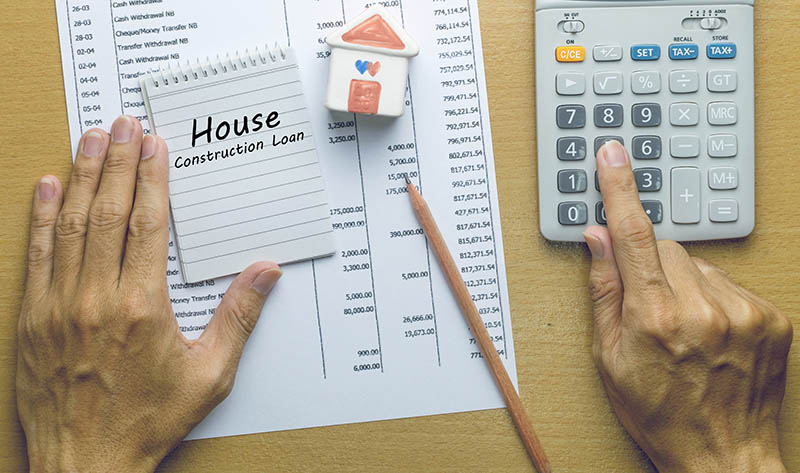How Do Construction Loans Work? What You Should Know
-
Pete Ortiz
- Last updated:

Construction loans are a type of short-term financing for people who need to build a home or commercial space. Generally, these loans are used to finance the purchase of land, materials needed for construction, and labor costs associated with building.
Unlike traditional mortgages, construction loans require special expertise in order to be processed properly; this is due to the fact that they are often a part of larger projects such as building a new home or commercial space. The construction loan process involves an assessment of the project’s timeline, budget, and risk involved for lenders to determine if the loan is feasible.
The purpose of this article is to provide an overview of how construction loans work and what you need to know when considering a construction loan.
How Do Construction Loans Work?

A construction loan is a short-term loan used to finance the building or renovation of a home or other real estate project. The loan is secured by the real property being built, which serves as collateral for the lender.
Unlike most traditional mortgages, construction loans are not paid out in one lump sum at closing. Instead, they are typically paid out in multiple installments as the construction progresses.
At closing, the lender will issue a check to the builder for a predetermined amount of funds that is used to cover initial building costs. As work continues on the project, additional disbursements may be made until the loan is fully funded and all funds have been allocated.
The borrower must be able to make regular payments to the lender during the construction process. These payments may include interest-only payments that cover only loan costs or actual principal and interest payments toward the total loan amount. When the project is complete, the borrower must then pay off any remaining balance or refinance into a permanent mortgage.
Overall, a construction loan can be a great option for those looking to finance a home renovation or construction project. The loan can offer flexible payments and allow the borrower to make payments as work progresses on the project.
However, it is important to understand all the terms and conditions of the loan before signing on for one. It is also important to consider if the final cost will be within your budget, as well as make sure you are working with a qualified and experienced contractor who can provide accurate estimates for project costs. With the right preparation, construction loans can offer borrowers the opportunity to create their dream homes.
What Are the Different Types of Construction Loans?
There are two main types of construction loans: short-term construction financing and long-term permanent financing. Let’s explore these two options in more detail.
1. Short-Term
Short-term construction financing usually comes in the form of a bridge loan and is used to purchase land, finance the construction of a new home, or make improvements to an existing property.
These loans usually have higher interest rates than other loan products and are typically due within one year. As such, you’ll want to be certain that you can pay back your loan in the allotted time.
Bridge loans provide a temporary solution for those who need short-term financing and cannot qualify for traditional long-term loans.
2. Long-Term Permanent
Long-term permanent financing is used to finance the construction of a new home or make improvements to an existing property.
Whereas short-term loans tend to have higher interest, long-term loans often have lower interest. What’s more, they’re typically due within 10 to 30 years as opposed to less than a year with short-term loans.
In both cases, your approval is based on the equity you have in the property, your credit score, and your income. So make sure that all of these factors are in your favor in order to qualify for the best loan terms.
Where Are These Loans Used?
As we touched on, construction loans are used by both homeowners and commercial entities to cover the cost of building a structure or make improvements to existing structures. Some of the most common uses for construction loans include:
- Building a new home
- Making renovations on an existing home
- Constructing an addition to an existing home
- Building a commercial property such as an office building, store, or warehouse
- Making improvements to a commercial property, such as renovating or expanding the building
- Financing the development of land for residential or commercial use
As you can see, construction loans serve many different purposes and are incredibly versatile. This makes them well-suited for nearly any kind of project that requires significant funding upfront, whether it’s for residential or commercial use.

Advantages of Construction Loans
Construction loans offer a number of advantages that make them attractive to both builders and investors. Some of the main benefits include:
- Flexibility: Construction loans are highly customizable, meaning you can tailor your loan terms to meet your specific needs.
- Speed: Once approved, construction loans can be funded quickly, allowing you to get started on your project as soon as possible.
- Low-Interest Rates: Construction loans often come with competitive interest rates, making them a great option for those looking to save money on their loan.
- Tax Benefits: Construction loans may be eligible for certain tax benefits, depending on the type of project you’re undertaking.
Overall, construction loans offer borrowers the flexibility and financing they need to bring their projects to life. While they do come with certain risks, these can be managed with careful planning and research.
If you’re considering a construction loan for your next project, make sure you understand all of the terms and conditions before signing any agreements. This will help ensure that you’re getting the best deal and that your project is a success.
Disadvantages of Construction Loans
While construction loans offer many advantages, they do come with certain drawbacks that borrowers should be aware of. Some of the main disadvantages include:
- High Risk: Construction loans are generally considered high-risk investments, so lenders may require collateral or a higher interest rate to offset the risk.
- Lengthy Process: Construction loans typically involve a lengthy process, from application to approval. This can be especially time-consuming if you have little experience in the real estate or construction industries.
- Shorter Term: Construction loans typically come with shorter terms than other types of loans and may require repayment within a few years.
- Costly Fees: Construction loans may involve various fees such as origination, closing, and appraisal fees.
In addition to the disadvantages outlined above, construction loans also tend to be more complex than other types of financing. This can make them less accessible for those who don’t have strong knowledge or experience in the real estate or construction industries.

Frequently Asked Questions (FAQs)
What is a construction loan?
A construction loan is a short-term loan used by homeowners and contractors to cover the cost of building or remodeling a home. It’s typically paid out in installments as the work is completed, with one lump sum at the end for any remaining costs. The lender has a lien on the property until the loan is paid in full.
How long do construction loans last?
Construction loans usually have a term of 12 to 24 months, depending on the size and complexity of the project. During this time, interest may accrue, but payments are typically not required until completion or end of the loan term.
What types of projects can construction loans be used for?
Construction loans can be used to cover a variety of projects in both residential and commercial settings. These can include new home construction, additions, remodeling existing homes or buildings, creating an outdoor living space, or constructing a pool or deck.
Conclusion
Construction loans can be a great way to finance your next building project. They allow you to get the funds necessary for construction upfront and pay them back over time as the project progresses.
However, it’s important to understand all of the terms and conditions associated with these loans before signing on the dotted line. So research and work with a reputable lender to ensure that the loan process goes smoothly. With careful planning, construction loans can be an effective tool for funding your dream project.
Featured Image Credit: Zephyr_p, Shutterstock
Contents


